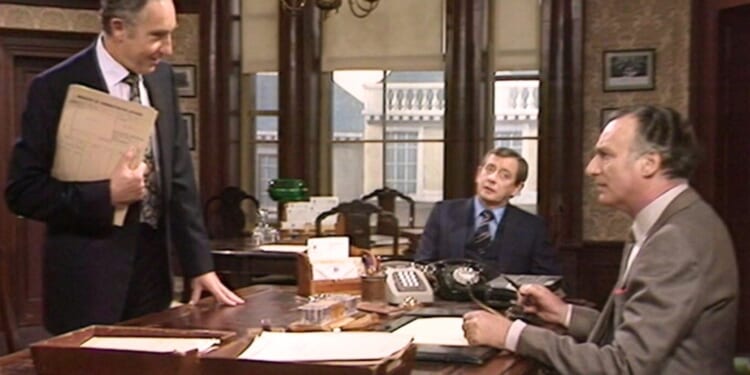Rishi Sunak had vowed to get the UK’s finances back in order, and I was working in the private office of the Secretary of State for Transport. My brief was rail, an area that required a not insignificant amount of funding — funding that Treasury types aren’t exactly enthusiastic about granting. Naturally, there’s haggling, the outcome of which was being relayed by my Treasury opposite number. “I’m sorry,” I said, “but I think it’ll be a hard sell on our side.”
But then, halfway through explaining why this is so, an internal email flashed up. “PO colleagues,” it stated, “please leave the loos as you’d wish to find them”. My snort must’ve been audible. “I didn’t quite catch that,” replied my puzzled opposite number. I apologised, resuming my explanation. The whole interaction lasted seconds, but captures the sublimity and ridiculousness that comes with working in a Whitehall private office. One minute, you’re grappling with the great issues of state. The next, you’re getting reminders about flushing.
No wonder Whitehall is in trouble. For in this awkward balancing of economics and etiquette, private offices highlight a far broader problem. Instead of a relentless focus on administration and implementation, you are simultaneously swimming against a tide of lower-order corporate missives — something that stalks every corner of our rickety civil service, and which burrows to the heart of why the modern British state struggles to get anything done.
Private office is a long-standing feature of the Whitehall institutional architecture, with roots back to Victorian times. This was the era of the Northcote-Trevelyan reforms, which made civil-service appointments something obtained meritocratically, instead of happening via patronage. A small private office, with appointees supporting ministers with their duties, quickly became accepted as part of the package: especially as state capacity and ministerial workloads dramatically increased. Where there were perhaps 15,000 civil servants in the early 1850s, that number had jumped to over 200,000 by the end of the First World War.
By the Sixties, the typical private office has been staffed by small cadres of private secretaries, usually young career civil servants, whose remit is to support ministers in their day-to-day roles. The work of private secretaries varies, but usually covers administration (overseeing the ministerial diary and proof-reading correspondence); bridging (acting as the minister’s voice within their department and across Whitehall); and counsel (offering advice on a particular course of action). Private secretaries are also supported by a range of colleagues — messengers, clerks, Parliamentary staff — as well as the ubiquitous special advisers, politically appointed staff whose remits cover advising their ministerial bosses on strategy, policy, and media.
Given private offices are one of the primary mechanisms through which our elected representatives can make good on their promises, their effectiveness has important democratic implications. The standard view, indeed, is that this arrangement works well and actually represents one of the few aspects of the British state that still functions tolerably. Reflecting on her time in government, the former Labour bigwig Patricia Hewitt has said that ministers rely on their private office “every minute of the day”.
And, certainly, when a private office works, it’s an invaluable source of support for ministers. To borrow a phrase from one ex-colleague, they’re “crack teams” of bright, switched-on public servants, who are as adept at acting as their principal’s eyes and ears as they are challenging inchoate policy proposals or working with special advisers to help unpick a particularly knotty issue. One former colleague performed heroics in bringing together official and political representatives to secure agreement on a particularly high-stakes pay proposal.
Unfortunately, self-congratulation risks obscuring several issues, both operational and cultural, all of which urgently need addressing. One of the charges that repeatedly arises is that of passivity, with some private secretaries acting in response to issues, rather than in anticipation. I won’t pretend not to have fallen victim to this, especially dealing with rail — where an absence of negative media is taken as proof that the network is “operating” (or, at least, not imploding). This creates a culture where firefighting is prioritised over longer-term thinking. I used to joke that half of my role involved coordinating responses to various leaks or instigating “who knew what, when” exercises following cost overruns.
Reactive short-termism affects vast swathes of the Whitehall behemoth, something most visibly manifested in treating an announcement as job done. Following the “Network North” announcement, a £36 billion plan to bolster transport out of London, a set of graphics was published showing the regions money from the cancelled HS2 Northern Leg would be going to. Given the uproar from Northern politicians and journalists about the economic implications of the decision for their own turf, you might have thought that, amid all the rush to get the announcement out, someone would’ve questioned the optics of a graphic proudly proclaiming that London was getting a chunk of HS2 Northern Leg wonga. Not so — much to Andy Burnham’s glee.
“Reactive short-termism affects vast swathes of the Whitehall behemoth”
It’s probably telling here that ex-ministers seem particularly frustrated by the unwillingness of private secretaries to offer meaningful challenge: or even an opinion of their own. This deference is sometimes manifested in over-the-top theatrics that wouldn’t look out of place in an Oxbridge am-dram production: think unctuous nods buttressed by a performative “yes, minister”.
One explanation for this deference is the fact that many private secretaries are so young and inexperienced. I myself started when I was just 24, something that can unsurprisingly cause chaos in practice. I remember one private secretary “laying the title” for a Written Ministerial Statement. This refers to an arcane parliamentary process where a brief title — for example, “Rail Update” — appears on the Parliamentary Order Paper, signalling that a government statement on the area is due the next day.
In this case, unfortunately, the trigger-happy private secretary pressed go despite the fact that they knew the (contentious) text was still with No. 10. Far from eliciting a quick approval, then, it meant they had to frantically come up with a bland holding text to publish, fending off a ministerial dressing down from the Speaker. Parliamentary custom dictates that it is very poor form to suggest a ministerial statement is coming only for the relevant department not to follow through. Many private secretaries also lack a clear understanding of what best practice looks like, even for something as simple as penning a pithy memo.
Pairing an inexperienced private secretary with an inexperienced minister is an even bigger challenge: the former has too little knowledge of navigating Whitehall, rendering them unable to guide their principal through its byzantine acronyms and procedural vagaries. I recall a situation where a minister was pressing their private secretary on the status of clearance for a policy. The answer was that it was being held up by multiple departments, because of a system known as “write-round” (where you need to get every member of Cabinet to approve). But because their private secretary was new, they could only respond that the policy was “stuck”.
With their sharp political chops, special advisers are very good at stopping such mishaps. Yet their numerical scarcity — there are, according to recent data, less than 130 spread across 26 ministerial departments — means they can’t plug the gaps all the time. And even if a minister doesn’t rate their private secretary, or isn’t gelling with them on a personal level, it’s very hard to move them because of Civil Service rules and internal squeamishness about rocking the boat.
If stodginess is one problem, churn is another: the Institute for Government puts the average lifespan of a private secretary at barely 18 months. It’s the same story across Whitehall. According to the Civil Service’s own data, more than a tenth of bureaucrats either moved departments or left the civil service altogether in 2024. Combined with the sensitive work of private secretaries, that only guarantees more policy cock-ups. The dubious logic of civil service hiring doesn’t help either. All jobs are classified under four professions: operational delivery, policy, functional, or specialist. Private office is technically deemed as policy, but requires a different and distinct set of skills, not least networking across government. Though the modus operandi of the private secretary is to observe from the shadows, communication remains critical.
Then you have HR — and I’m not just talking about managing the sometimes-fraught relationships between politicians and officials. In a work environment where 20-somethings are working in close proximity to each other, every day, there’s bound to be liaisons amoureuses or personality clashes. Where these get trickier is when the interactions are between junior private office staff, or between or junior private staff and seniors, especially if the latter are mandarins. These are, of course, important things to be on top of but, as with the toilet etiquette missive, the way the system is geared is that you’re sometimes asking the same 20-somethings to act as corporate gurus — quite the busted flush.
What, then, can be done? Perhaps a Club 18-30 holiday for staffers to get things out of their systems. On a more serious note, structural reform is obviously needed. This isn’t an argument for a return to the “extended ministerial offices” of the Coalition era — allowing ministers more largesse to bring external appointees into their offices — not least because that created another layer between ministers and officials. A hyper-political bureaucracy in the American mould is a bad idea too, especially when it guts institutional memory and makes appointment in effect a reward for how fervently one parrots the party line.
One alternative could be the model used in France and Australia, which blends more closely administrative and political functions. Democracies are inherently political, and to govern is to choose, with every decision sure to have implicit or explicit political ramifications. Civil servants in these places have political affiliations: and this hasn’t led to systemic collapse. But leave things as they are, and Whitehall could yet face its own implosion, whether inside the bathroom or out.

















